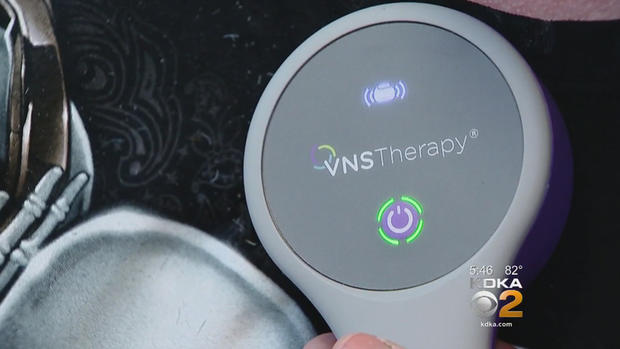New Generation Of Device Helps To Stop Seizures Before They Start
Follow KDKA-TV: Facebook | Twitter
PITTSBURGH (KDKA) -- Scott Smith has had seizures since he was 10.
"I can have 40 a day," he says
"We were scared to death and sick," says his mother, Barbara Smith.
He would suddenly lose consciousness, go limp, and then he would fall and convulse. Some episodes have been dangerous.
"He came down the steps one night, hit the window, smashed the glass, and came down, rolled in a curtain, all the broken glass with him," Barbara describes. "They clocked 300 in a week. That's a lot of seizures. You didn't even want him to walk around the block unless somebody was with him. And, of course, he's 51-years-old and he wants to go himself, and I don't blame him."
Epilepsy, or recurrent seizures, is a problem when the brain's electrical signals are abnormally excited. The electrical impulses can make the body shake, or make it seem like someone isn't paying attention.
Scott has tried many anti-seizure medications, and he's had several brain surgeries to try to disrupt the abnormal signals. And he's had vagus nerve stimulators.
"It's a device that's implanted in the chest wall, and it sends impulses through the vagus nerve to the brain, so it is an electrical treatment for epilepsy," explains Allegheny General Hospital neurologist, Dr. Andrea Synowiec.
In fact, he has had three of these stimulators. Each one an upgrade from the previous model. The older ones were operated by a magnet worn by the patient.
"She told us about this new one that was coming out. That he wouldn't have to wear the magnet. The magnet picks up silverware at the dinner table, picks up everything," says Barbara. "He has to get it over. And if he gets too far into the seizure, he has no control to do that."
The latest version is automatic -- it detects a seizure coming on when there's an increase in heart rate. It send electrical impulses to stop the seizure. Scott can feel his throat tightening when the device activates.
"I'll feel better in about 10 minutes, so..." he says.
It also detects when patients are lying on their bellies, a risk factor for sudden death with epilepsy.
"There are some scary things about epilepsy, and one of them is that people with epilepsy have a higher risk of dying," says Dr. Synowiec. "We know that can happen in association with seizures at night, and in people who sleep on their bellies."
Scott still takes medication, but the latest version of the device has cut his seizures way back. He doesn't even have one every day now.
"I just wish they were gone," says Barbara, "We've had 40-some years of them. I would love to see him be able to get out of the house. He'd like to go kayaking. He'd like to do so many things. I always wanted his life to be good at the end."




